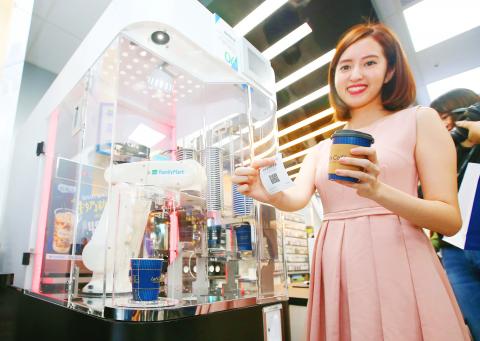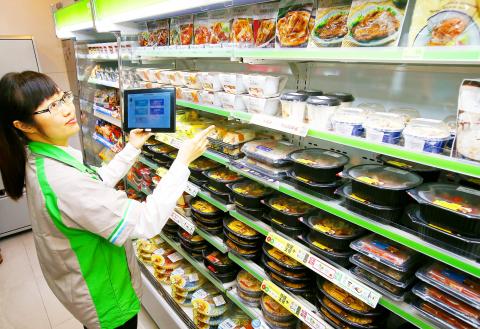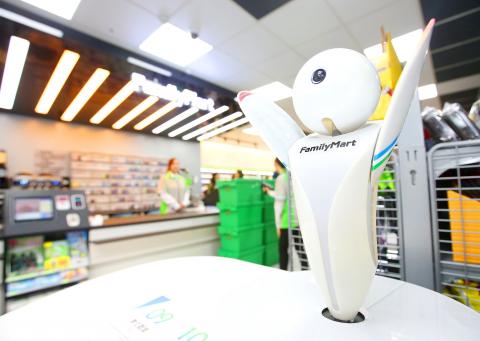Taiwan FamilyMart Co (全家便利商店) on Thursday last week launched a concept store in Taipei on the intersection of Chongqing S Road and Wuchang Street, beginning a field trial that aims to attract customers to the store while reducing the burden on staff by using digital technologies such as robots and blockchain technology.
The new store marks the beginning of Taiwan FamilyMart’s efforts to transform into a next-generation convenience store chain, the Chinese-language Liberty Times (the sister newspaper of the Taipei Times) reported.
In collaboration with Fujitsu Ltd, Microsoft Taiwan Corp (台灣微軟), Plenty Island Taiwan Corp (和椿科技), LWO Technology Co (凌暉科技), BenQ Corp (明基電通) and several other business partners, Taiwan FamilyMart wants to build an open platform where they can receive input from other industries to meet different demands, the newspaper reported.

Photo: CNA
Taiwan FamilyMart operates the nation’s No. 2 convenience store chain, with 3,168 stores as of Feb. 26, the company said on its Web site.
Taiwan FamilyMart said the concept store provides a unique customer experience, which includes a robot to guide customers around the store, a content delivery service and a video communication solution.
The store’s entrance counter is equipped with a 3D camera to count the number of store visitors, while the use of electronic price tags enables consumers to interact with point-of-sale registers while allowing the store to update stock information automatically, it said.

Photo: CNA
The concept store also uses digital technologies — including Internet of Things, big data, artificial intelligence, radio frequency identification, near-field communication and blockchain technology — to lessen staff members’ work burdens, from product ordering and goods receiving to item inspection and display, the newspaper said.
While FamilyMart is not planning to open cashier-free stores in the near future, it would add a self-checkout counter at the concept store in the second half of this year, the company said.
The company on Thursday reported a net profit of NT$1.41 billion (US$48.4 million) for last year, up 2.19 percent from the previous year, with record-high earnings per share of NT$6.3.

Photo: CNA
Consolidated revenue increased 6.38 percent annually from NT$60.57 billion to NT$64.43 billion, thanks to a better product portfolio and contributions from e-logistics businesses, the company said.
The company’s board has approved a cash dividend of NT$5.5 per share, equivalent to a payout ratio of 87.3 percent and a yield of 3.21 percent in terms of its closing share price of NT$171.5 on Saturday.

Sweeping policy changes under US Secretary of Health and Human Services Robert F. Kennedy Jr are having a chilling effect on vaccine makers as anti-vaccine rhetoric has turned into concrete changes in inoculation schedules and recommendations, investors and executives said. The administration of US President Donald Trump has in the past year upended vaccine recommendations, with the country last month ending its longstanding guidance that all children receive inoculations against flu, hepatitis A and other diseases. The unprecedented changes have led to diminished vaccine usage, hurt the investment case for some biotechs, and created a drag that would likely dent revenues and

Global semiconductor stocks advanced yesterday, as comments by Nvidia Corp chief executive officer Jensen Huang (黃仁勳) at Davos, Switzerland, helped reinforce investor enthusiasm for artificial intelligence (AI). Samsung Electronics Co gained as much as 5 percent to an all-time high, helping drive South Korea’s benchmark KOSPI above 5,000 for the first time. That came after the Philadelphia Semiconductor Index rose more than 3 percent to a fresh record on Wednesday, with a boost from Nvidia. The gains came amid broad risk-on trade after US President Donald Trump withdrew his threat of tariffs on some European nations over backing for Greenland. Huang further

CULPRITS: Factors that affected the slip included falling global crude oil prices, wait-and-see consumer attitudes due to US tariffs and a different Lunar New Year holiday schedule Taiwan’s retail sales ended a nine-year growth streak last year, slipping 0.2 percent from a year earlier as uncertainty over US tariff policies affected demand for durable goods, data released on Friday by the Ministry of Economic Affairs showed. Last year’s retail sales totaled NT$4.84 trillion (US$153.27 billion), down about NT$9.5 billion, or 0.2 percent, from 2024. Despite the decline, the figure was still the second-highest annual sales total on record. Ministry statistics department deputy head Chen Yu-fang (陳玉芳) said sales of cars, motorcycles and related products, which accounted for 17.4 percent of total retail rales last year, fell NT$68.1 billion, or

HSBC Bank Taiwan Ltd (匯豐台灣商銀) and the Taiwan High Prosecutors Office recently signed a memorandum of understanding (MOU) to enhance cooperation on the suspicious transaction analysis mechanism. This landmark agreement makes HSBC the first foreign bank in Taiwan to establish such a partnership with the High Prosecutors Office, underscoring its commitment to active anti-fraud initiatives, financial inclusion, and the “Treating Customers Fairly” principle. Through this deep public-private collaboration, both parties aim to co-create a secure financial ecosystem via early warning detection and precise fraud prevention technologies. At the signing ceremony, HSBC Taiwan CEO and head of banking Adam Chen (陳志堅)